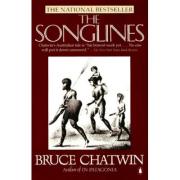by Bruce Chatwin -- Viking (Elisabeth Sifton Books). New York, NY. 1987 (first edition hardcover)
Author
Bruce Chatwin was the golden child of contemporary English letters. Paradoxically, however, his books appeared relatively late in his life: until 1977, when the 37-year-old author published In Patagonia, this precocious, intense figure had occupied himself as an art specialist at Sotheby's, a journalist with the Sunday Times, an archaeologist, and a restless, perennial traveler. Once he got started, of course, Chatwin made up for lost time. By 1989, when he died, he had produced seven books--including two superb novels and his masterpiece, The Songlines -- and won himself a worldwide audience. – Amazon.com
Blurbs
“For Australian aborigines ‘songlines’ are the string of sites of significant cultural events, such as marriage, song, trades, dances, a hunt, etc., in an individual's and group's history. They are the invisible means by which a man indicates and keeps track of his territory. British author Chatwin organizes his book around the Australian aboriginal's notion of songlines, although the writing is more often than not on the periphery of this theme. Interspersed with the explanation of songlines are a narrative of a mild adventure, sometimes with novelistic dialogue, and jottings from Chatwin's notebooks (making up a considerable portion of the book), which include his own musings and observations, proverbs, and quotes from famous people, most of which concern travel and wandering and theory about instinct, myth, etc. -- Library Journal. Copyright 1987 Reed Business Information, Inc.
Part adventure-story, part novel-of-ideas, part satire on the follies of "progress," part spiritual autobiography, part passionate plea for a return to simplicity of being and behavior, The Songlines is a seething gallimaufry of a book. -- Andrew Harvey, New York Times Book Review
Why Read It
I have long been interested in the idea that human travel can be best understood through narrative. This applies to simple walking trips down the street and as much as to cross-country train journeys. However, it was this book that opened my eyes to the anthropological concept that our language and even our music may have originated in long, memorized “songlines.” We humans are descended from nomads who migrated over long distances and needed to remember and pass along to their children rarely-traveled routes that connected widely dispersed places in the vast territories within which they roamed. Songlines were chants that “sang” of the landmarks in prehistoric landscapes and enabled people to make long journeys using these cultural maps. The concept sounds dry, but the book is a great read.


